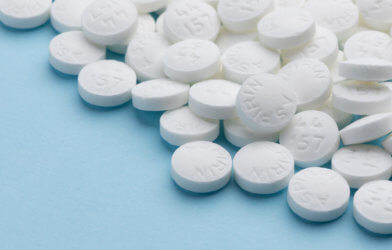SAN DIEGO — Big abs could spell bad news for a man’s health. Body composition, which is typically defined as the amount of fat, bone, and muscle in the body, is a concept frequently used by health professionals in relation to heart health. However, researchers from the University of California-San Diego are challenging this, suggesting that more muscle doesn’t automatically mean a lower risk of heart problems.
Britta Larsen, PhD, explains that men with a larger abdominal muscle area have a greater risk of heart disease. As far as muscle density goes, the prognosis is much different. Men with the densest muscle within the abdominal cavity had nearly one quarter of the risk of heart disease later in life.
“And the other really important thing to note is that we didn’t find this with women. It was just in men,” says Larsen, the study’s lead author and associate professor in the UC San Diego Herbert Wertheim School of Public Health and Human Longevity Science, in a media release.
The data comes from computed tomography of participants in the National Institutes of Health Multi-Ethnic Study of Atherosclerosis (MESA). Study authors explored the thickening of the arteries starting in 2000, examining participants in their mid-60s recruited from around the country. Follow-up visits took place after 20 years. Larsen notes that her research group also followed each person’s medical records for 12 years.
The team found that the large-muscle group’s heart disease risk was nearly six times higher than the group of men with the smallest abdominal muscle area. The team wasn’t expecting to see such a strong correlation between increased muscle area and coronary heart disease.
“Muscle has been overlooked in health for a long time,” explains Larsen. “Researchers have really just focused on fat. But muscle is a large, active metabolic tissue, and it’s finally getting a little bit more attention.”

According to the researcher, the difference between muscle area and muscle density comes down to quantity versus quality.
“Density is a little bit trickier. It’s sort of our proxy measure of muscle quality,” Larsen adds. “It’s really a measure of how much fat has infiltrated the muscle cavity. Within the muscle itself, how much is pure muscle? And how much is fat content?”
Additionally, the team did not find a correlation between muscle and stroke in either men or women. For the research, coronary heart disease and cardiovascular disease were distinguished because the latter includes a risk of stroke.
“What that tells me is that muscle density isn’t just sort of a proxy measure of overall health or frailty or aging,” Larsen concludes. “Otherwise, we would see it with stroke and other outcomes, too.”
Now, Larsen says that the project opens up more paths for research and poses new questions to answer. Given that it was only men that had a higher area of abdominal muscle and a greater risk of coronary problems, it now begs the question of why that doesn’t seem to be the case for women.
Moreover, the mechanisms involved to explain this muscle and coronary link are still unknown. It’s possible that genetics could be involved, but diet and exercise could be more likely, according to the researchers.
The findings are published in the Journal of the American Heart Association.




What is the correlation if you are simply fat??
Headline is misinformation. Study shows larger surface area muscles (e.g. men with larger stomachs) have higher risk of heart disease. Article clearly states in paragraph 2 that men with higher density (e.g. more dense, stronger fibred muscles, gained through exercise) are 75% less likely to have heart disease. Fix your headline.
I agree. The bottom line is that the larger the waist line, the greater the risk of heart disease. The headline is just another excuse not to exercise and perform weight training. Total BS.
This 100%
For this to be more useful, we’d need to know about the diets and whether it’s the muscle/fat that’s the issue or if it’s the foods consumed to increase the amount of muscle. My guess would be that it’s not strictly the muscle but the food source. I guess you would find differences between men with similar amounts of abdominal muscle/fat based on whether they were vegan or meat eaters and possibly also a difference in meat eaters based on their protein sources/levels of saturated fat.
As well as if Exogenous hormones contributed to larger muscle beds. (Such a BGhlH and HGH)
Right, as many in the body building world with ‘six pack abs’ also take steroids to get there. A huge risk factor for heart attack and strokes.
Not to mention human growth hormone (combined with insulin), it grows your organs and stretches out your abdomen in such a way that shredded bodybuilders with <5% body fat will have a condition called palumboism aka "HGH gut". HGH abuse also has similar risks as traditional anabolic steroids.
Incoherent garbage due to misleading photos and headline. “[M]en with a larger abdominal muscle area have a greater risk of heart disease. As far as muscle density goes, the prognosis is much different. Men with the densest muscle within the abdominal cavity had nearly one quarter of the risk of heart disease later in life.”
In other words, fat guys have heart problems; guys with actual abdominal muscle are much healthier.
The author of this article, particularly the headline, needs to learn how to read.
setting stage to say “he died from heart issues due to him working his abs too much, not from the covid shot”
Big abs are especially hazardous if you’ve also had the clotshots. Then again, most subjects are especially hazardous if you’ve had the clotshots.
either silly study or poor write up. “muscle area”?? WTF is that? volume, density I get. not “area.” publish or perish I guess.
it’s called inter-visceral/visceral fat, fat that is under the abdominal wall that causes the area of the abdominal surface to expand. Like the hgh gut mentioned above here, one can have very visible abdominal muscles as the ab wall pushes out, and many men don’t have to use hgh to get this condition; it’s a long known fact high levels of visceral fat are an indicator for increased risk of artery/coronary diseases.
Oh please F off with this bull$hit. LEt’s just make every one fat. Is that what you want. F off.
Study finds that Study Finds lies.
Another ‘theory’. They all are proved false in the end.
The headline is VERY deceiving..The takeaway is that LESS dense muscle (more fat ridden) makes men less healthy versus quality, low fat abdominal muscle. “Steroid gut” is a perfect eample. Less dense, less quality muscle.